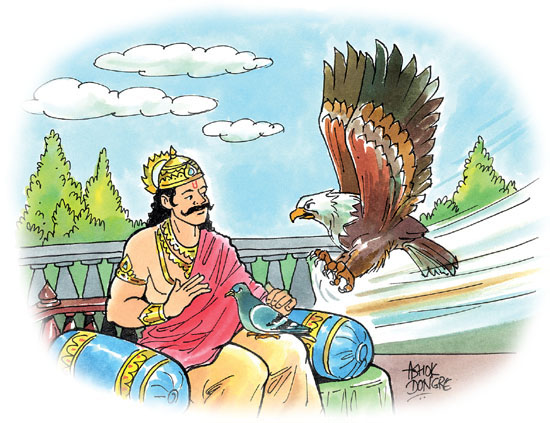Dec 24, 2025
Dec 24, 2025
After Bharata, his descendants flourished as mighty Kurus. Their kingdom extended in north India, the capital city of which was Hastinapur. The successive great kings ruled from here; great not only in material prosperity but also in their strength of character. Their whole life and activity was centered around upholding the rule of Dharma – righteousness. To these noble rulers, life was meaningless if not lived according to the Dharma. For this, they even went as far as sacrificing their own lives. The Mahabharata stories presented here are in chronological order and are aimed to provide a fair amount of knowledge to our young readers.

Once, nobody knows when, sage Vishwamitra was engaged in great austerities and penance that would give him almost absolute power over kingdom of Earth and Heaven. He had successfully completed requisite sacrificial rituals and now was engaged in meditation and Yogic practices.
The king of Heaven, God Indra, was shaken to know this effort of Vishmamitra that could pose danger to his throne! Therefore, Indra decided to put obstacles in his austerities and thereby break his sadhana - spiritual discipline. Indra thought of using weapon of lust to this end.
Accordingly, the most beautiful and ever youthful Apsara, Menaka, was sent from heaven to distract and seduce Vishwamitra, who was gaining alarming levels of yogic power through his concentrated meditation. (Apsara in Hindu mythology, heavenly nymph of great beauty, is often represented as a dancer at the court of the Hindu god Indra in his heavenly kingdom.) She descended down to earth from heaven and tried to tempt Vishmamitra by various charming dances and songs. After some efforts Vishmamitra fell to the lure of her beauty and youthful attraction.
They were married and the tapas of Vishmamitra was broken. A beautiful daughter was born to them whom they named Shakuntala.
Her assignment completed, Menaka left back to the kingdom of heaven, and Vishmamitra, his tapas broken, left for forest retreat after handing over the new born baby to the sage Kanva, head of a forest ashrama. Under his fatherly love and care Shakuntala grew up as a simple but most beautiful lady. Her voice was sweet and her manners sober and graceful.
Continue Next Page
12-Aug-2010
More by : Dr. C.S. Shah

|
Shakuthala was abandoned by Dushyantan due to the karma dosha of sage Viswamithra. The karma dosha from her father was transferred to her. |

|
moral of the story? |

|
It is indeed the tragedy of India. Unity is not in our hearts. Why? That is a question which needs research and introspection. If Indians can answer that a lot of our problems will be solved. Look at the map of India. Have you seen the TV channels, advertisements etc using the map of India ever show the Andaman and Nicobar Islands!? The vast ocean which lies between the land is India's wealth. Indians do now ant to show it. The author is after all a product of a society grown on the misconception that India is North India. India is vast. In its vastness lies the seed of greatness and strength dormant and hidden with a lot of potential. If only authors and intellectuals would kindle it and build a movement to appreciate that real strength is in realizing this. |

|
it was awesome |

|
Oh my God.. it is disheatening in observing how the little minds are infused with wrong information by teaching them that the mahabharath is a story of north india. how about east,west,south and the west of india? this is the hieght of idiocity. india at that time includes all of subcontinent inclidinng presentday pakistan and afghaistan.. instead of saying kurus ruled north india the author cound have just said kurus ruled india. |

|
yo this is coo' |